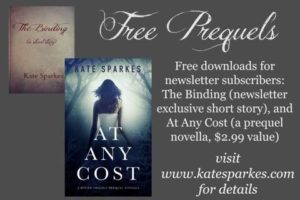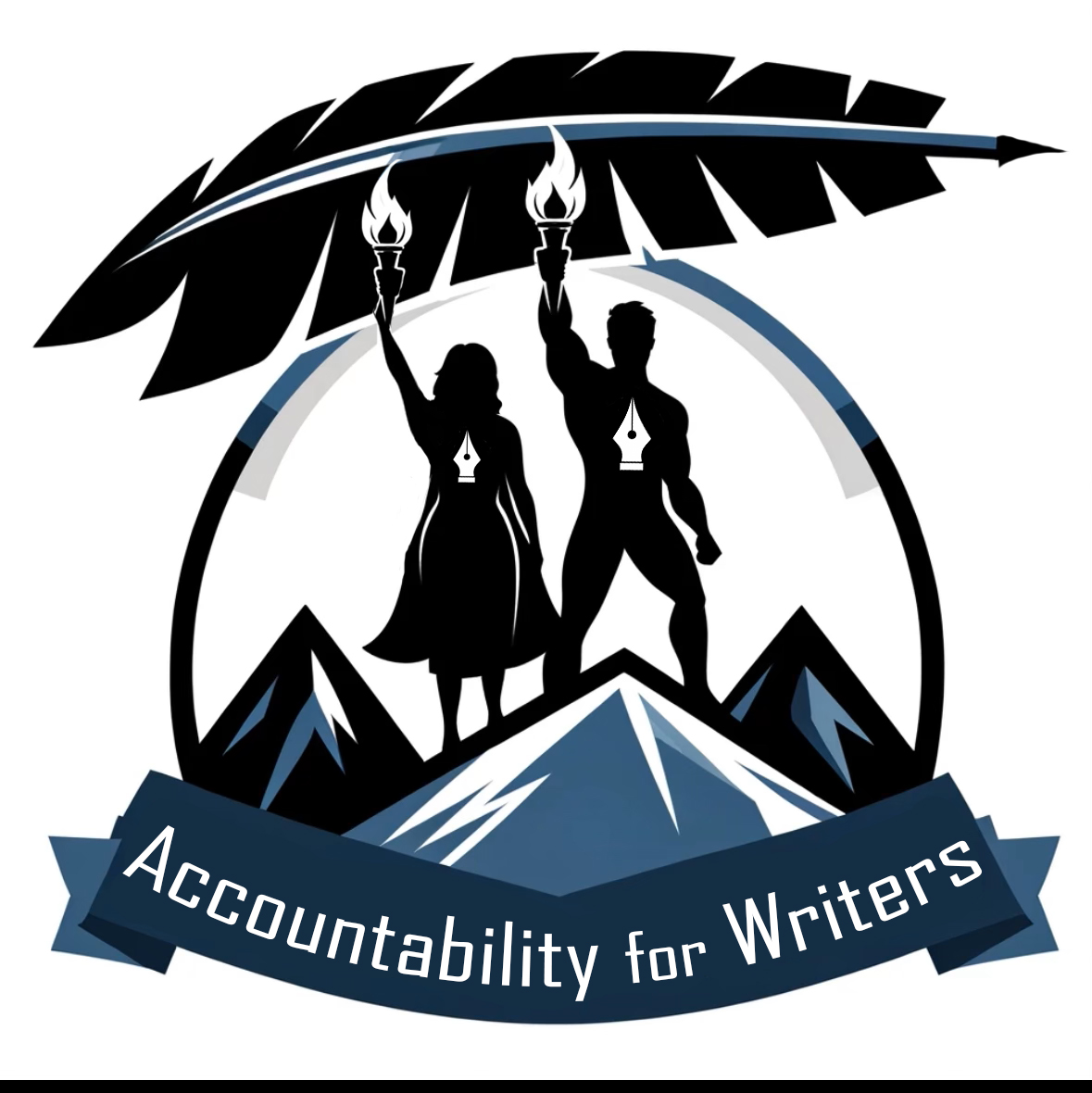Interview with Author Kate Sparkes on Showing Up For Your Art (pt 1)
I recently had a chance to catch up with Kate Sparkes, author of the wonderful Bound Trilogy. I asked her a lot of questions, from how she shows up for her art, to how she prepares for launch, and even markets her book. This will be a 5-part series exploring how this talented author who has managed to spin her dream of a full-time writing career into reality, shows up for your art. I hope you enjoy it!
If you haven’t read Kate’s work yet, well, get to it – you won’t regret it. Let’s begin with a little bio:

Kate Sparkes lives on the magical island of Newfoundland, where she’s always checking wardrobes, locked doors, and interesting caves to see whether they lead to new worlds. She passes the rest of her time hanging out with her family, reading, walking her dogs, and writing fiction that lets her come very close to escaping reality.
She likes sending treats to newsletter subscribers, so be sure to sign up for bonus content, sneak peeks, advance review copies, news about future books, contests, and more! Visit www.katesparkes.com for details.
Kate Sparkes on Showing Up For Your Art
Laura: How do you develop your ideas?
Kate: I like to let them fester for a while. I find that if I start on an idea too soon after I have it, it will come out flat. Something will be missing. The brilliant, snarky character whispering in my ear will have showed up with a weak plot, or the kick-ass concept and plot have no deep character to support them. So I let things percolate for a while and write down ideas in my notebook until I feel like I have something really solid, compelling, and nearly complete.
At least, in theory. In practice I’m still jumping into things way too soon and having to let go of half-written projects because they’re not ready (or more accurately, I’m not ready to make them the best they can be).
Laura: Are you a plotter or a pantser?
Kate: Plotter. I used to think that using an outline would somehow stifle my creativity, but I’m finding that I’m creative in deeper ways when I’m not struggling to figure out the plot. If I know what’s coming, I can concentrate on developing the characters and the themes. Now, sometimes that means that those characters can change the plan because I realize that my outline won’t work for them, but it’s much easier to change an existing plan (for me) than it is to meander through a story, get to the end, and then have to change it all because the beats are all off and I’ve written 50,000 words of exploration while I was trying to find the plot.
Laura: Any tips or suggestions on plotting?
Kate: Understand story structure. Read a few books on it, think about how it applies to books you’ve loved… and then try not to think too hard about the rules while you build your outline. If you’re a life-long reader, you probably understand most of this stuff instinctively. Grab onto the information that helps you, and don’t feel pressured to use what doesn’t. And I personally recommend leaving wiggle room for character-driven changes, but that might not work for everyone.
Laura: Do you write daily or when inspiration hits?
Kate: It should be daily. I do better when I have that consistency. But I have very limited energy, and daily writing tends to get in the way of family time and housework. So I try to just work when my kids are in school. Weekends can be really hard for me because I want to be working, and then Mondays are hard because I’ve lost my groove. Some day it will be daily. For now I’m trying to find a good balance.
But sometimes when inspiration isn’t hitting, I will take a break. I did that over the summer, partly because of the kids being home and partly because a project just wasn’t working. I wasn’t waiting for inspiration, though, so much as answers about whether this was really what I should be working on. And it turned out that it wasn’t.
Laura: How do you push through blocks, or even just the drudge-work aspects of writing?
Kate: As I said above, sometimes I don’t push through. If the story’s not ready in spite of my planning, I’ll set it on the back burner. But for times when I have to push through, like when I’m trying to finish a series that readers are waiting on? Sometimes that’s torturous. I remember fighting through headaches and brain fog while I was working though my editor’s notes on Sworn, and I was in tears. I knew what I needed to do to rewrite a scene, but the words wouldn’t come out of my head. In that case I changed scenery, wrote in bed, and just pushed through.
The key for me there was forward motion. I didn’t know whether the words were good. I didn’t care. The only important thing was that they were coming. I could always fix them later.
And as it turned out, they were good. Thank goodness.
Laura: Character or plot driven?
Kate: Characters are shaped by plot, but plot should always be driven by the characters. I’ve seen some promising books fall flat because the protagonist didn’t drive her story, just had things happen to her. So if I have to choose, character.
Laura: Favorite type of hero? Villain? Anything else you LOVE to see in a work?
Kate: Clever villains. Not the cackling “HAHA, BOND, I HAVE CAUGHT YOU IN MY LASER SHARK POOL AGAIN!” clever, but witty and devious. That’s just delicious.
And unlikely heroes. That includes reluctant heroes, which I have a real weakness for, but also meek heroes. Geeky heroes. Heroes who don’t kick ass from page one or after one big training montage, but who really have to fight for it. I’m tired of tough-as-nails-and-will-kick-your-face-in-with-her-spike-heeled-boots heroines and muscly-dude-on-a-quest-for-truth guys. Not that they don’t have their place. I just really like heroes who don’t start out fitting that role.
Laura: aI’m really loving your answers – I relate to so many of these. Ok, how about favorite genre to write for?
Kate: Fantasy. I’m always waiting for the magic to show up even when I’m reading contemporary books. I can’t imagine writing something without it, or gods, or monsters, or something fantastical. I write to escape, and I like to get really far away.
Laura: Do you sprint, participate in NaNoWriMo, or use other motivation or supports?
Kate: I do word sprints with writer friends if things are really tough. Just knowing that I have to report back to someone in 25 minutes often helps me focus, though it’s always non-competitive. I’m in a lovely facebook group that offers a different level of accountability on a longer-term basis. And NaNoWriMo is what got me started, really, so I always try to participate and support their programs.
Laura: Who or what helped you get to your first and/or last book?
Kate: NaNoWriMo was really what kicked my ass into gear and got me through drafting my first book. Before that it was all false starts. My perfectionism kept me revising the first few chapters, which got really frustrating. I always gave up. NaNo said it was better to push through and finish the first draft, and that turned out to be a good strategy for me. I realized that it was only after finishing that I could look back and really see what needed to be done to make the story good.
I still try to stick to that advice, but it’s hard. There’s a part of me that really wants my first draft to be great, so the temptation to edit as I go is still there.
Laura: Why do you write?
Kate: I’m struggling with that question a lot these days. It used to be because my stories fascinated me and I wanted to spend as much time with them as possible. Now that it’s how I make a living, it’s beginning to feel like work, and I can feel myself pushing away from it. I’m really trying to get back to writing being my playground rather than my day job. It’s a tough balance.
Thanks so much, Kate! Click here to read the rest of the series: part 2 here, part 3 here, part 4 here, and part 5 here. You can check out some of Kate’s work for free – check out how:




